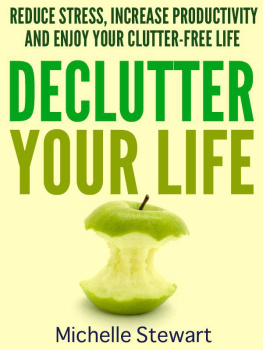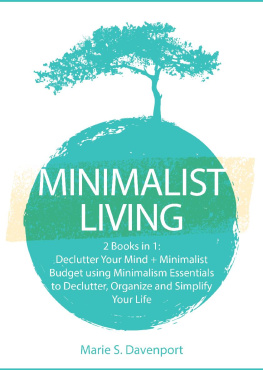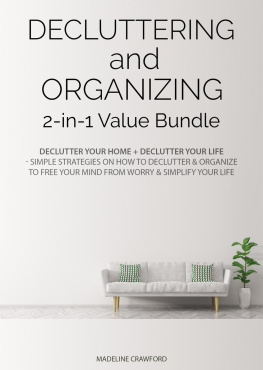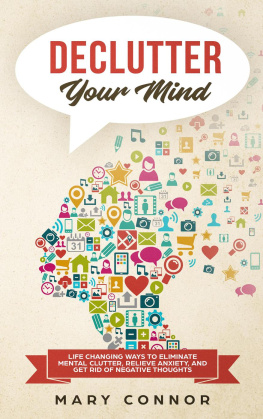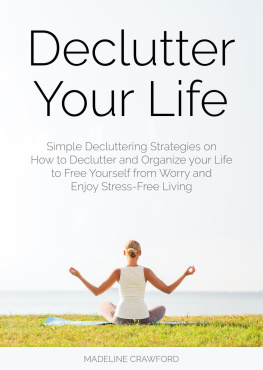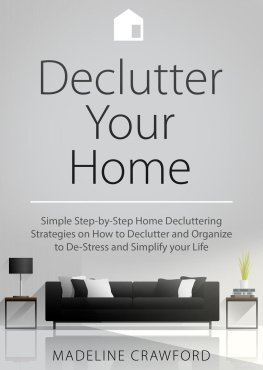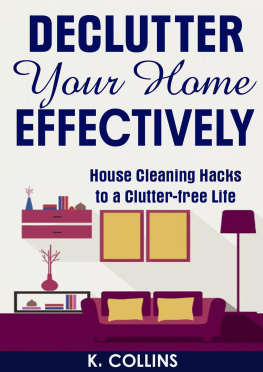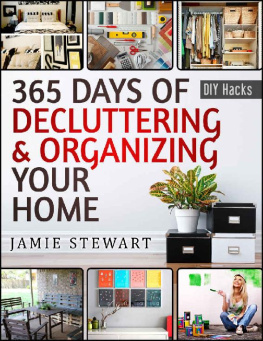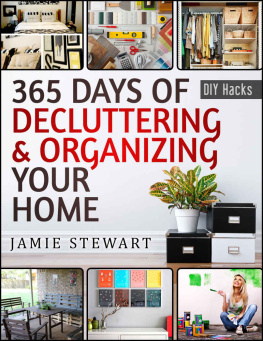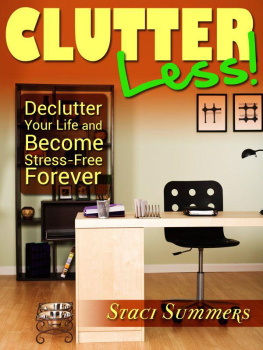Declutter Your Life
Reduce Stress, Increase Productivity, and Enjoy Your Clutter-Free Life
By Michelle Stewart
Declutter Your Life: Reduce Stress, Increase Productivity, and Enjoy Your Clutter-Free Life / by Michelle Stewart
Copyright 2012 by Unique Vision Press. All RightsReserved. Published in the United States by Unique Vision Press. First Edition.
You are welcome to use a shortexcerpt of this book for review or critique purposes.
Visit the Blog: LifeIteration.com
Other books by Michelle Stewart
De-Stress Your Life
The Frugal Life
The Beautiful Home
Find them all at MichelleStewartBooks.com
Table of Contents
A Clutter-Free Life Starting Today
I have a friend who recently lost her husband in a tragic accident. Her friends and family rallied around her, but she was reluctant to let people into her home so they could help her. People offered to cook, clean or simply spend some time with her, but she was very selective about accepting the offers of help and many people did not know why. It was only weeks later that I learned that she had been feeling ashamed of the state of her house. There was clutter throughout the home and outbuildings, and it would take her months to go through it all.
Perhaps you have a similar situation. If you are reluctant to invite friends over for dinner or scared to look in your own closet, then you might have a problem with clutter. You should not be ashamed, however. Clutter is a very common problem and can arise in almost any area of our lives. The key is acknowledging the clutter, creating a plan for dealing with it, and taking immediate action, as well as consistently guarding against clutter in the long-term.
The Truth About Clutter
Often, we think of clutter in terms of physical stuff. We see books and magazines spilled across the coffee table, extra dishes stacked on the counter, and clothing draped over the dresser, the treadmill and any other available surface in the bedroom. The truth is that clutter can also be an emotional, mental and social issue. If you have trouble getting to sleep because your mind is crowded with competing thoughts or you are exhausted by jam-packed weekly schedules, then you may need to deal with clutter of a different sort.
To define clutter, first you need to know what clutter is not. Clutter is not dirt. You can be the best housekeeper in the world when it comes to mopping the floor and scrubbing the tub, but still succumb to the problem of clutter piling up on your shelf and desk.
Clutter is not hoarding. Hoarding involves an often unhealthy process of being reluctant to part with unnecessary stuff. Clutter generally involves an unintentional collection of items throughout your space or home. Hoarding may require outside intervention, while clutter requires a commitment to organization.
Clutter is not necessarily the same thing as a collection. My husbands aunt collects odds and ends from around the world. She displays them in cabinets or on shelves. Although her house is full of collectibles, it does not have a feeling of being cluttered. This is because the way she displays her items is organized and she does not keep them in walkways or areas of common use such as kitchen counters or the dining table.
The Origins of Clutter
Before removing clutter, it is a good idea to find out its origin. You would not scoop rising water from your basement without first closing off the source of the leak. Clutter comes from every person living in a home. Kids create tons of clutter by leaving toys out, dragging home small goodies from parties or kids meals, and collecting sets of toys like Barbies and Legos.
Adults similarly generate clutter. We often think we are too busy to put something in the proper place, so we set it on the dining table to deal with later. Those things add up and before you know it, a small pile is growing. You might also gain clutter through junk mail, catalogs and magazine subscriptions.
The key to organizing your clutter is recognizing that you play a role in creating it. Often, families never make it through a decluttering process because they are too busy blaming each other for the problem. By admitting that every person plays a role in contributing to clutter, you can move forward to finding a solution.
The Cost of Clutter in Your Life
Whether or not you realize it, clutter has a price in your life. It could be costing you in areas of productivity, finances, emotional well-being and physical health. Everyone deals with clutter in their own way, and each persons clutter threshold is different. For example, when I was a teenager, my mother would say, You have got to clean that room! It is a mess and there is stuff everywhere! What was chaos to her ended up being a couple of pairs of jeans thrown over furniture and several books scattered on the floor. On the other end, my husband had a small office in our home. For several years, you could not even reach the farthest wall due to stacks of paper and boxes of electronics. His clutter threshold is obviously higher than my mothers, but there is a happy medium between absolute order and reigning chaos. It is in that happy medium that most people will find the best state.
The Cost in Productivity
One of the most common costs of clutter has to do with productivity and time. If you lose five minutes every morning searching for something that is not in the right place, then you are giving up over 30 hours per year. If that does not seem like a lot to you, here are some things you can enjoy or do in 30 hours:
- Watch 15 movies,
- Read three to six books,
- Take an overnight trip, or
- Earn 30 hours of overtime at your job.
Clutter at your office desk can cost minutes every day and can even result in lost work. Social clutter may cause you to overbook appointments or waste time with poorly made plans. Mental clutter can slow you down and even cause anxiety that keeps you from necessary tasks. No matter how you slice it, clutter interferes with your ability to get things done.
The Cost in Dollars
Clutter can hit your wallet and you never realize it. The kitchen in our home is galley style with minimal cabinet and counter space. My husband repurposed three old cabinets and put them in the basement to act as an overflow pantry. The space quickly became cluttered, mostly because I did not feel like going into the basement to check on our canned good needs every time I shopped or cooked. Additionally, one of the cabinets was out of my reach and required a stool for access. It was a perfect breeding ground for clutter, and we did see a financial impact. I often bought items we already had and used things that were out of date. The result was that we threw away expired food on several occasions before we reorganized our food storage.
Other ways you might see a cost in dollars include buying replacement items for those that you cannot find or that are damaged in the clutter. If you do find an item that was part of a pile or unorganized shelf, you might find that it was damaged and that you need to pay for repair costs. However, the cost of clutter is not only related to the accumulation in your home or office. It can also generate from the actions that lead to clutter in the first place.
Buying items that you do not need, do not have a place for or are purchasing on an impulse can lead to clutter. They also cost money that you could spend on things you really need or save for a rainy day. Retail establishments play to our impulses by creating attractive displays at the end of aisles, putting things on sale and using a variety of proven psychological methods to increase the number of items customers bring to the checkout. One of my weaknesses is buying things that are on sale for a great deal. If an item is regularly $20 but is marked down to $11, I think I save $9. My husband is quick to point out that we did not need the item or plan to buy it. Thus, instead of saving $9, we spent $11.
Next page
